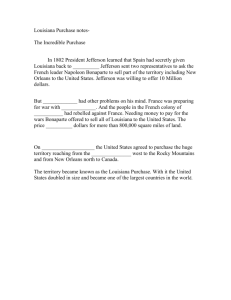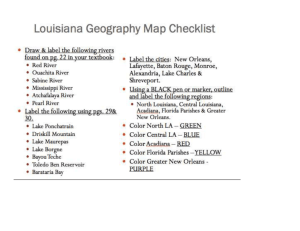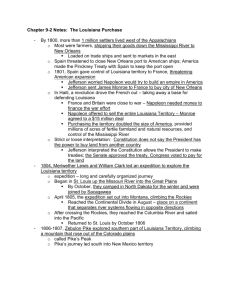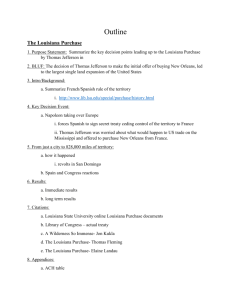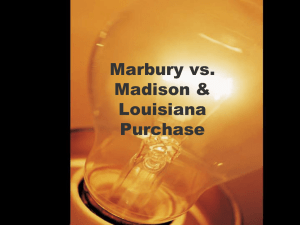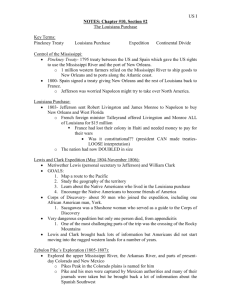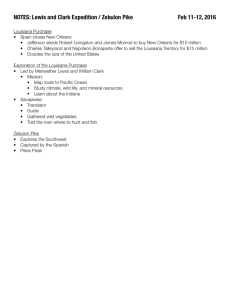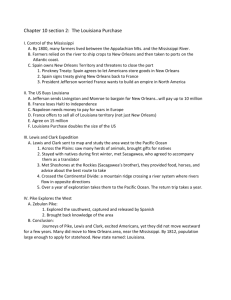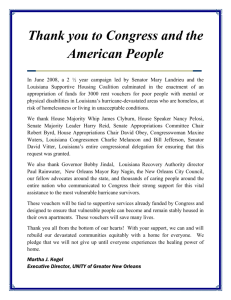Document Based Question: The Louisiana Purchase
advertisement
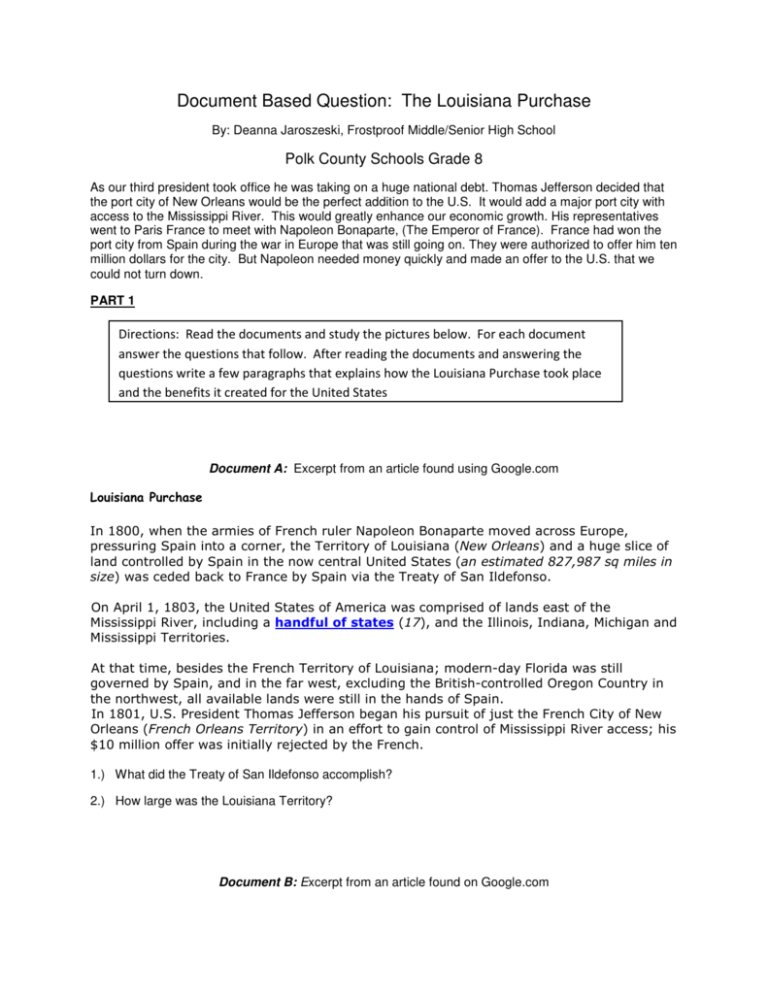
Document Based Question: The Louisiana Purchase By: Deanna Jaroszeski, Frostproof Middle/Senior High School Polk County Schools Grade 8 As our third president took office he was taking on a huge national debt. Thomas Jefferson decided that the port city of New Orleans would be the perfect addition to the U.S. It would add a major port city with access to the Mississippi River. This would greatly enhance our economic growth. His representatives went to Paris France to meet with Napoleon Bonaparte, (The Emperor of France). France had won the port city from Spain during the war in Europe that was still going on. They were authorized to offer him ten million dollars for the city. But Napoleon needed money quickly and made an offer to the U.S. that we could not turn down. PART 1 Directions: Read the documents and study the pictures below. For each document answer the questions that follow. After reading the documents and answering the questions write a few paragraphs that explains how the Louisiana Purchase took place and the benefits it created for the United States Document A: Excerpt from an article found using Google.com Louisiana Purchase In 1800, when the armies of French ruler Napoleon Bonaparte moved across Europe, pressuring Spain into a corner, the Territory of Louisiana (New Orleans) and a huge slice of land controlled by Spain in the now central United States (an estimated 827,987 sq miles in size) was ceded back to France by Spain via the Treaty of San Ildefonso. On April 1, 1803, the United States of America was comprised of lands east of the Mississippi River, including a handful of states (17), and the Illinois, Indiana, Michigan and Mississippi Territories. At that time, besides the French Territory of Louisiana; modern-day Florida was still governed by Spain, and in the far west, excluding the British-controlled Oregon Country in the northwest, all available lands were still in the hands of Spain. In 1801, U.S. President Thomas Jefferson began his pursuit of just the French City of New Orleans (French Orleans Territory) in an effort to gain control of Mississippi River access; his $10 million offer was initially rejected by the French. 1.) What did the Treaty of San Ildefonso accomplish? 2.) How large was the Louisiana Territory? Document B: Excerpt from an article found on Google.com In 1801, U.S. President Thomas Jefferson began his pursuit of just the French City of New Orleans (French Orleans Territory) in an effort to gain control of Mississippi River access; his $10 million offer was initially rejected by the French. Over the next year Napoleon was actively involved in his growing European military campaign against Britain, as well as other political conflicts in the Americas; apparently stretched-thin, he tired of his Louisiana Territory (and needing focus and funds) he finally wavered, and on April 30, 1803 he authorized the sale of the entire French Territory of Louisiana for $15 million, which included the City of New Orleans; justifiably, President Jefferson was jubilant. The nation-changing Louisiana Purchase subsequently almost doubled the size of the United States overnight. This massive transfer of land included all of present-day Arkansas, Oklahoma, Missouri, Kansas, Nebraska and Iowa; most of Colorado, South Dakota, Montana and Wyoming, as well as significant parts of North Dakota, Minnesota, Texas and Louisiana. Parts of it also extended into what is now Canada for a short period of time. Eventually Spain ceded (lost) all of its territories to the United States, beginning in Florida in 1819, as the modern-shape of the U.S.A. finally came together. 3.) Why did Thomas Jefferson want the city of New Orleans? 4.) How much money did Napoleon sell the Louisiana Territory to the U.S.for? 5.) What did the purchase of Louisiana do to the size of the United States? Document C: Google images 6.) Who do you think the men in this picture are? 7.) What do you think is happening in this picture? Document D: WorldAtlas.com 8.) What countries owned the three major territories of North Americas? 9.) Name four states that were acquired through the Louisiana Purchase? Document E: Source Unknown “The Prairie Dog sickened at the sting of the Hornet or a Diplomatic puppet exhibiting his deceptions!” 10.) Who does the hornet represent? 11.) Who does the puppet represent? 12.) The prairie dog represents who? 13.) What is the prairie doing? 14.) Describe the meaning of this cartoon. PART 2 Use the information discussed in class and in this DBQ to write a summary of the Louisiana Purchase. Discuss what lead to it and how the United States was effected by it. Was it a positive or negative influence on the U.S. economy?
